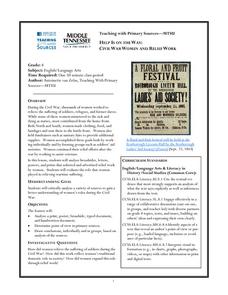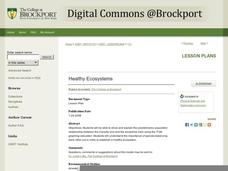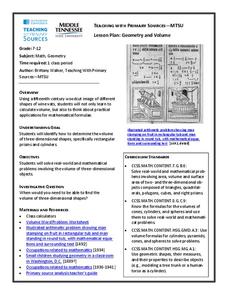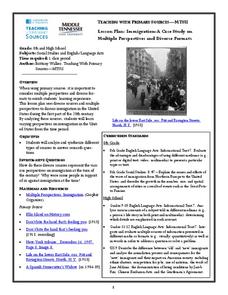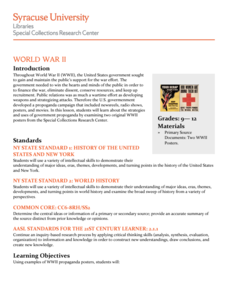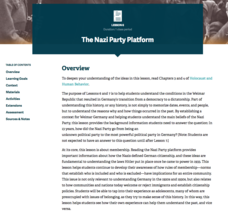Curated OER
The Time Machine
Challenge your class with this instructional activity! Learners read The Time Machine by H.G. Wells, discuss context clues, identify main ideas and details, and analyze story elements. Discussion questions and activities are broken down...
Middle Tennessee State University
Preparing for Revolution
Class members create a timeline of actions by both the British parliament and the colonists that led to the outbreak of the American Revolution. Groups use the provided Primary Source Analysis Tool to examine and...
Facing History and Ourselves
Taking a Stand: Models of Civic Participation
How does an individual take a stand for a principle or belief? what skills are required to do so? What are the challenges and risks in doing so? Class members study examples of individuals engaging in such activities and then identify...
Middle Tennessee State University
Help Is on the Way: Civil War Women and Relief Work
The role women played in the Civil War, especially in relief efforts, is the focus of this seven-page resource. Groups examine primary source materials to determine how this work reflected and expanded the traditional roles women held in...
College at Brockport
Healthy Ecosystems
Is there a connection between the snowshoe hare population and the lynx population? Young scientists will examine this question and graph actual data to determine the relationship between these two species, as well as researching another...
St. Joseph Community Consolidated School District #169
Nutcracker
'Tis the holiday season and the Clara, the Sugar Plum Fairy, and the Nutcracker Prince come alive with a teaching and study guide for Tchaikovsky's famous ballet. Background information, activities, games and puzzles are all included in...
Virginia Department of Education
Geometry and Volume
The history of math is fascinating! Utilize a woodcut primary source image from 1492 and posters from the 1930s to help geometers apply their volume-calculation skills to real-life questions.
Middle Tennessee State University
The Invention of the Telephone
All of the people in your class would agree that life would be different without the invention of the telephone! Study Alexander Graham Bell's most famous and influential invention through the primary source document of his...
Middle Tennessee State University
Fights, Freedom, and Fraud: Voting Rights in the Reconstruction Era
As part of a study of post Civil War era, young historians investigate the changes in voting rights during the Reconstruction Era (1863-1876), the fraud involved in the Hayes-Tilden presidential election of 1876, and efforts by Pap...
Library of Congress
Industrial Revolution
Could you live without your phone? What about cars, steel, or clothing? Class groups collaborate to produce presentations that argue that either the telephone, the gramophone, the automobile, the textile industry, or the steel...
Middle Tennessee State University
Lesson Plan: Immigration: A Case Study on Multiple Perspectives and Diverse Formats
As part of a case study of U.S. immigration during the first part of the 20th century, class members examine a variety of primary sources that present multiple perspectives of the responses of those in favor of immigration and those...
Syracuse University
Harlem Renaissance
The music and literature of the Harlem Renaissance defined American culture, including its poetry. Using a poem from the period, individuals explore its musical qualities and how it is reflective of the period. Then, they use what they...
Syracuse University
Ancient World Writing System
Most twenty-first century pupils don't know how to interpret cuneiform. Examining images of cuneiform and papyrus writing and using a chart and Venn diagram, young historians extrapolate what life may have been like for people who lived...
Syracuse University
Erie Canal
While canals are not the way to travel today, in the first half of the nineteenth century, they were sometimes the best way to move goods and people. Scholars examine primary sources, including maps and pictures, to investigate the role...
Syracuse University
Women's Suffrage Movement
Women gained the right to vote in the twentieth century, but the fight for equality dates back centuries. Using an invitation to an 1874 suffrage convention, eager historians consider the motivations behind supporters of the suffrage...
Syracuse University
World War I
World War I was known for its gruesome battlefields and horrific injuries. Using photographs from a battlefield surgeon's scrapbook, scholars see first-hand what life was like in the trenches. After creating a timeline of the war using...
Syracuse University
World War II
During World War II propaganda was as important to the war effort as the soldiers in the field. Scholars consider how the government communicated messages of patriotism with propaganda by examining pieces from World War II. Then, they...
Syracuse University
American Industrial Revolution
While the Industrial Revolution may have fueled America's rise to the top of world markets, the child laborers often faced dangerous conditions. Using primary source images and other information, scholars consider what these children...
Syracuse University
Civil War
What was it like to enlist as a soldier in the Civil War? By using enlistment papers, young scholars consider this question. After they've looked at the primary source and discussed it, they create a short story of a fictional soldier to...
Hazardous Waste Management Program
Molar Mass Determination from Freezing Point Depression
Let the data tell the story. A lab activity has pupils collect temperature data on solutes as they melt and freeze. They use their data to create a cooling curve and then calculate the molar mass using the freezing point depression.
Facing History and Ourselves
Tactics of Nonviolence
High schoolers analyze the direct action tactics of nonviolence. As a class, they distinguish between a strategy and a tactic and identify tactics used during the civil rights movement. They relate these tactics and how they might be...
Facing History and Ourselves
Kristallnacht: Decision-Making in Times of Injustice
Have you ever been singled out in a crowd before? Pupils investigate and analyze the events of the Holocaust. They dive into the life of a middle school student, as well as the diary entries of those in Kristallnacht during World War...
Facing History and Ourselves
Justice After the Holocaust
Though there could be no true justice for the horrors of the Holocaust, many of those responsible for crimes against humanity were found guilty in the eyes of the law. Using primary and secondary sources in the 16th installment of a...
Facing History and Ourselves
The Nazi Party Platform
Not all party platforms stay democratic. A resource covers many political issues in Germany during the time of World War II, and teaches pupils about the Nazi party platform and what went wrong. Individuals participate in a warm-up...
Other popular searches
- The Library of Congress
- Map of a Library
- End of Year Library Activities
- Purpose of Classroom Library
- Photo of School Library



